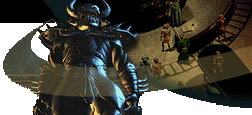School Descriptions
Abjuration spells are a group of specialized protective spells. Each is used to prevent or banish some magical or nonmagical effect or creature. They are often used to provide safety in times of great danger or when attempting some other particularly dangerous spell.
Alteration spells cause a change in the properties of some already existing thing, creature, or condition. This is accomplished by magical energy channeled through the wizard.
Conjuration/Summoning spells bring something to the caster from elsewhere. Conjuration normally produces matter or items from some other place. Summoning enables the caster to compel living creatures and powers to appear in his presence or to channel extraplanar energies through himself.
Divination spells enable the wizard to learn secrets long forgotten, to predict the future, and to uncover things hidden or cloaked by spells.
Enchantment/Charm spells cause a change in the quality of an item or the attitude of a person or creature. Enchantments can bestow magical properties on ordinary items, while charms can unduly influence the behavior of beings.
Illusions/Phantasms deal with spells to deceive the senses or minds of others. Spells that cause people to see things that are not there, hear noises not made, or remember things that never happened are all illusions.
Invocation/Evocation spells channel magical energy to create specific effects and materials. Invocation normally relies on the intervention of some higher agency (to whom the spell is addressed), while evocation enables the caster to directly shape the energy.
Necromancy is one of the most restrictive of all spell schools. It deals with dead things or the restoration of life, limbs, or vitality to living creatures. Although a small school, its spells tend to be powerful. Given the risks of the adventuring world, necromantic spells are considered quite useful.

